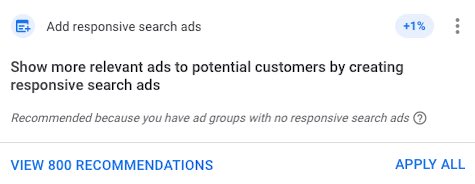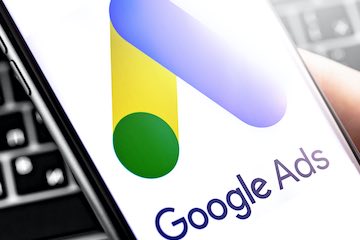The work of a pay-per-click ad specialist is seemingly never complete — more optimizations are always possible. Google Ads provides a recommendations tab to help. These include changes to core account components, such as:
- Keywords,
- Ad copy,
- Budgets,
- Bidding.
Google’s recommendations do not always align with advertisers’ goals in my experience. The recommendations do not guarantee a performance improvement.
The first item to notice in the recommendations tab is “Your optimization score.” It’s Google’s estimate of the account’s potential. The higher the score, the better.

“Your optimization score” is Google’s estimate of the account’s potential. The higher the score, the better.
The optimization score will increase when a recommendation is implemented. For example, the score will go up when the unused budget from one campaign is moved to another with a limited amount. Again, a higher score does not ensure better performance.
Google offers nearly 100 types of recommendations. I won’t cover all of them here. Instead, I’ll address those with the most impact.
Ads and extensions
Google’s most common recommendation is to create responsive search ads in every ad group.

Adding responsive search ads is Google’s most common recommendation.
RSAs are Google’s newest text ad version. They are a continuation of Google’s effort to automate ad tasks. Advertisers submit up to 15 headlines and four description lines. Google will then rotate to determine which combinations produce the highest click-through rate. Advertisers can apply, edit, or ignore those suggestions.
Nonetheless, advertisers should include at least one RSA in every ad group, regardless of Google’s recommendation. RSAs likely show in ad inventory that regular text ads do not.
Google’s other ad copy recommendations involve extensions and testing. Google will recommend extension options, such as sitelinks, if a campaign has none. All campaigns should include every relevant extension.
As for testing, Google will review ads with identical messages across the account (i.e., “free shipping”) and recommend a test for alternative copy or ads.
Automated Campaigns
Google has been pushing Smart campaigns — Display and Shopping. But only experienced advertisers should test them, in my view, at least on a broad scale. Smart campaigns assign most of the control to Google with little advertiser input.
Bidding and budgets
Be wary when Google recommends budget increases. Google focuses on campaigns with limited budgets or potential traffic increases and will show the anticipated change in conversions (from higher ad spend) and the per-conversion cost.
Google will also identify campaigns with excess budget, to transfer.

Google’s bidding and budget recommendations focus on campaigns with limited spend or potential traffic increases.
Moving campaigns to automated bidding is a recommendation I support as that strategy is more reliable now than in the past. Google will suggest an automated bidding option (i.e., Target CPA) and the target (i.e., $30). Advertisers can decide whether to adopt those recommendations.
Keywords and targeting
This section tends to be the most helpful as the recommendations are more conservative. They are often housekeeping tips, such as keywords to remove from your account because they haven’t received traffic or are redundant.
Other recommendations include pausing poor-performing keywords and removing or adding negative keywords.
Google can also recommend new keywords (and their estimated weekly search volume) for existing ad groups as well as new audiences for campaigns. Example audiences include:
- Remarketing,
- Similar users,
- In-market,
- Affinity.
Not all of the recommended keywords and audiences will make sense for every advertiser. The point is to suggest ways to reduce wasted ad spend and otherwise help ensure the search intent matches the ad.
Repairs
“Repairs” recommendations are intended to fix account errors, such as ad groups without keywords or ads, or disapproved items in your feed.




